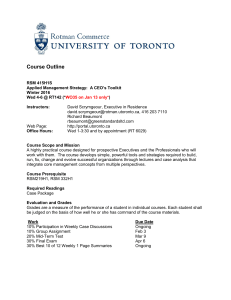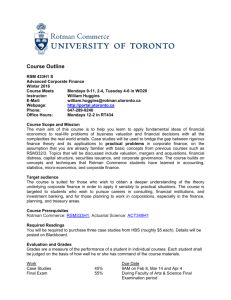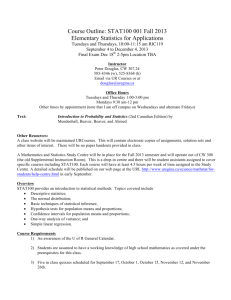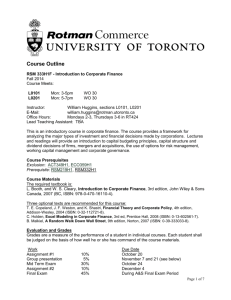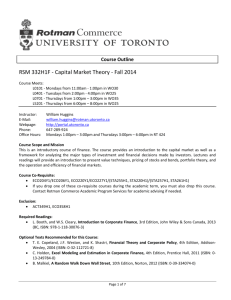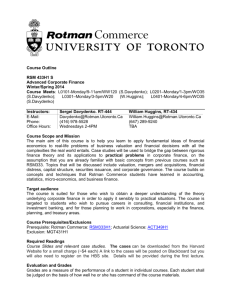RSM 323H1F - University of Toronto
advertisement
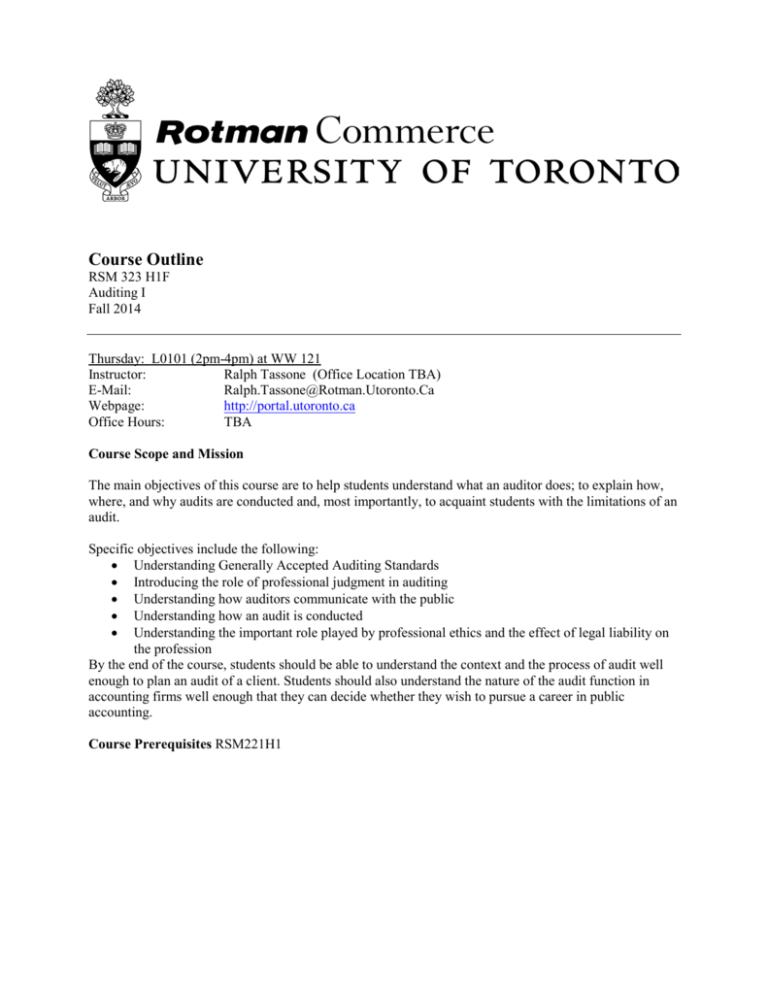
Course Outline RSM 323 H1F Auditing I Fall 2014 Thursday: L0101 (2pm-4pm) at WW 121 Instructor: Ralph Tassone (Office Location TBA) E-Mail: Ralph.Tassone@Rotman.Utoronto.Ca Webpage: http://portal.utoronto.ca Office Hours: TBA Course Scope and Mission The main objectives of this course are to help students understand what an auditor does; to explain how, where, and why audits are conducted and, most importantly, to acquaint students with the limitations of an audit. Specific objectives include the following: • Understanding Generally Accepted Auditing Standards • Introducing the role of professional judgment in auditing • Understanding how auditors communicate with the public • Understanding how an audit is conducted • Understanding the important role played by professional ethics and the effect of legal liability on the profession By the end of the course, students should be able to understand the context and the process of audit well enough to plan an audit of a client. Students should also understand the nature of the audit function in accounting firms well enough that they can decide whether they wish to pursue a career in public accounting. Course Prerequisites RSM221H1 Required Readings CPA Canada Handbook - Assurance (HB) Auditing: An International Approach (6th Edition), [2013] Smieliauskas and Bewley (SB) The Lakeside Company: case studies in auditing (12th Edition) [2012] Trussel and Frazer (Lakeside) Evaluation and Grades Grades are a measure of the performance of a student in individual courses. Each student shall be judged on the basis of how well he or she has command of the course materials. Quizzes 20% Midterm Test 30% Final Exam 50% Total 100% Course format and expectations 1. Quizzes To help students review course materials, several quizzes will be conducted during class time throughout the term. The total mark of the quizzes is 20% of the course, which will be evenly allocated to all quizzes written during the term. The number of the quizzes is not lower than four or more than six. These are open-book quizzes and the questions will be written responses, which may come from the textbook/casebook. You are required to bring textbook/casebook to each class. Each quiz will not take more than 15 minutes. A student who misses a quiz due to illness can receive a waiver given a medical certificate is received on a timely basis. The maximum number of waivers a student can receive for the course is ONE. 2. Midterm Test The midterm test will cover materials from Classes 1 to 5 (Chapters 1 to 7). The test will consist of questions similar to the questions and problems in the [SB] book. The contents related to class discussions, case materials, relevant CPA Canada Handbook materials, and the assigned textbook chapters may be examined. A student wishing to have his/her midterm test remarked must return the test to the instructor with an explanation within one week from the class the midterm was returned to the class. No tests, which were written in pencils or used white out will be remarked. 3. Missed Midterm Students may miss a term tests due to illness, domestic affliction, or in the case of part time students, work commitments, without academic penalty providing the appropriate documentation is received and approved in a timely manner. In such cases, students must notify Rotman Commerce on the date of the missed test (or due date in the case of course work) and submit supporting documentation (e.g. Verification of Student Illness or Injury form) to the Rotman Commerce Program Office within 48 hours of the originally scheduled test or due date. Students who do not provide Rotman Commerce or the instructor with appropriate or sufficient supporting documentation will be given a grade of 0 (zero) for the missed test or course deliverable. Note that the physician’s report must establish that the patient was examined and diagnosed at the time of illness, not after the fact. Rotman Commerce will not accept a statement that merely confirms a report of illness made by the student and documented by the physician. Students who legitimately miss the mid term test will have the final exam reweighed 4. Case Discussions Some cases in Trussel and Frazer book will be discussed during the term. Students are encouraged to familiarize themselves with the case materials since the materials may be included in mid-term test or final examination. The class discussions focus on DISCUSSION QUESTIONS from the cases. Students are encouraged to work on the exercises in these cases. 5. Final Examination The final examination will cover material from the entire course. The final exam will consist of questions similar to the questions and problems in the [SB] book. The class discussions, assignments, referred Handbook materials, and assigned textbook chapters for the whole course may be examined. Weekly Schedule Session Date Topic Readings 1 Sept. 11 Overview of professional practice [SB] Chapters 1 & 2 2 Sept. 18 Auditor’s ethical and legal responsibilities [SB] Chapter 3 Lakeside: Introductory case, Case 1 and Case 2. 3 Sept. 25 Reports on audited financial statements [SB] Chapter 4 4 Oct. 2 Preliminary audit planning [SB] Chapter 5 Lakeside: Case 3 5 Oct. 9 Assessing risks [SB] Chapters 6 & 7 Lakeside: Case 4 6 Oct. 16 Audit evidence and assurance [SB] Chapter 8 Lakeside: Case 6 7 Oct. 23 Midterm test Location to be announced 8 Oct. 30 Control assessment and testing [SB] Chapter 9 Lakeside: Case 5 9 Nov. 6 Audit Sampling [SB] Chapter 10 Lakeside: Case 9 and Case 10 10 Nov. 13 Performing auditing [SB] Chapters 11-14 Lakeside: Case 7 and Case 8 11 Nov. 20 Performing auditing [SB] Chapters 11-14 Lakeside: Case 7 and Case 8 12 Nov. 27 Completing the audit [SB] Chapters 15 2:00pm - 4:00pm Policy and procedure 1. Accessibility Needs The University of Toronto is committed to accessibility. If you require accommodations for a disability, or have any accessibility concerns about the course, the classroom or course materials, please contact Accessibility Services as soon as possible: disability.services@utoronto.ca or http://www.accessibility.utoronto.ca/. 2. Academic Integrity Academic Integrity is a fundamental value essential to the pursuit of learning and scholarships at the University of Toronto. Participating honestly, respectively, responsibly, and fairly in this academic community ensures that the UofT degree that you earn will continue to be valued and respected as a true signifier of a student's individual work and academic achievement. As a result, the University treats cases of academic misconduct very seriously. The University of Toronto’s Code of Behaviour on Academic Matters http://www.governingcouncil.utoronto.ca/policies/behaveac.htm outlines the behaviours that constitute academic misconduct, the process for addressing academic offences, and the penalties that may be imposed. You are expected to be familiar with the contents of this document. Potential offences include, but are not limited to: In papers and assignments: • Using someone else's ideas or words without appropriate acknowledgement. • Submitting your own work in more than one course without the permission of the instructor. • Making up sources or facts. • Obtaining or providing unauthorized assistance on any assignment (this includes collaborating with others on assignments that are supposed to be completed individually). On test and exams: • Using or possessing any unauthorized aid, including a cell phone. • Looking at someone else's answers • Misrepresenting your identity. • Submitting an altered test for re-grading. Misrepresentation: • Falsifying institutional documents or grades. • Falsifying or altering any documentation required by the University, including (but not limited to), medical notes. All suspected cases of academic dishonesty will be investigated by the following procedures outlined in the Code of Behaviour on Academic Matters. If you have any question about what is or is not permitted in the course, please do not hesitate to contact the course instructor. If you have any questions about appropriate research and citation methods, you are expected to seek out additional information from the instructor or other UofT resources such as College Writing Centres or the Academic Success Centre. 3. Email At times, the course instructor may decide to communicate important course information by email. As such, all UofT students are required to have a valid UTmail+ email address. You are responsible for ensuring that your UTmail+ email address is set up AND properly entered on the ROSI system. For more information please visit http://help.ic.utoronto.ca/category/3/utmail.html Forwarding your utoronto.ca email to a Hotmail, Gmail, Yahoo or other type of email account is not advisable. In some cases, messages from utoronto.ca addresses sent to Hotmail, Gmail or Yahoo accounts are filtered as junk mail, which means that important messages from your course instructor may end up in your spam or junk mail folder. 4. Blackboard and the Course Page The online course page for this course is accessed through Blackboard. To access the course page, go to the UofT Portal login at https://portal.utoronto.ca/ and log in using your UTORid and password. Once you have logged in, look for the My Courses module where you’ll find the link to all your course websites. If you don’t see the course listed here but you are properly registered for the course in ROSI, wait 48 hours. If the course does not appear, go to the Information Commons Help Desk in Robarts Library, 1st floor, for help, or explore the Portal Information and Help at www.portalinfo.utoronto.ca/students and review the Frequently Asked Questions. 5. Recording Lectures Lectures and course materials prepared by the instructor are considered by the University to be an instructor’s intellectual property covered by the Canadian Copyright Act. Students wishing to record a lecture or other course material in any way are required to ask the instructor’s explicit permission, and may not do so unless permission is granted (note: students who have been previously granted permission to record lectures as an accommodation for a disability are, of course, excepted). This includes tape recording, filming, photographing PowerPoint slides, Blackboard materials, etc. If permission is granted by the instructor (or via Accessibility Services), it is intended for the individual student’s own study purposes and does not include permission to “publish” them in anyway. It is absolutely forbidden for a student to publish an instructor’s notes to a website or sell them in any other form without formal permission. 6. Conduct of Classes and Expectations Classes will begin at ten minutes after the hour, in accordance with university policy. Students are expected to arrive on time so as not to disrupt the class.


